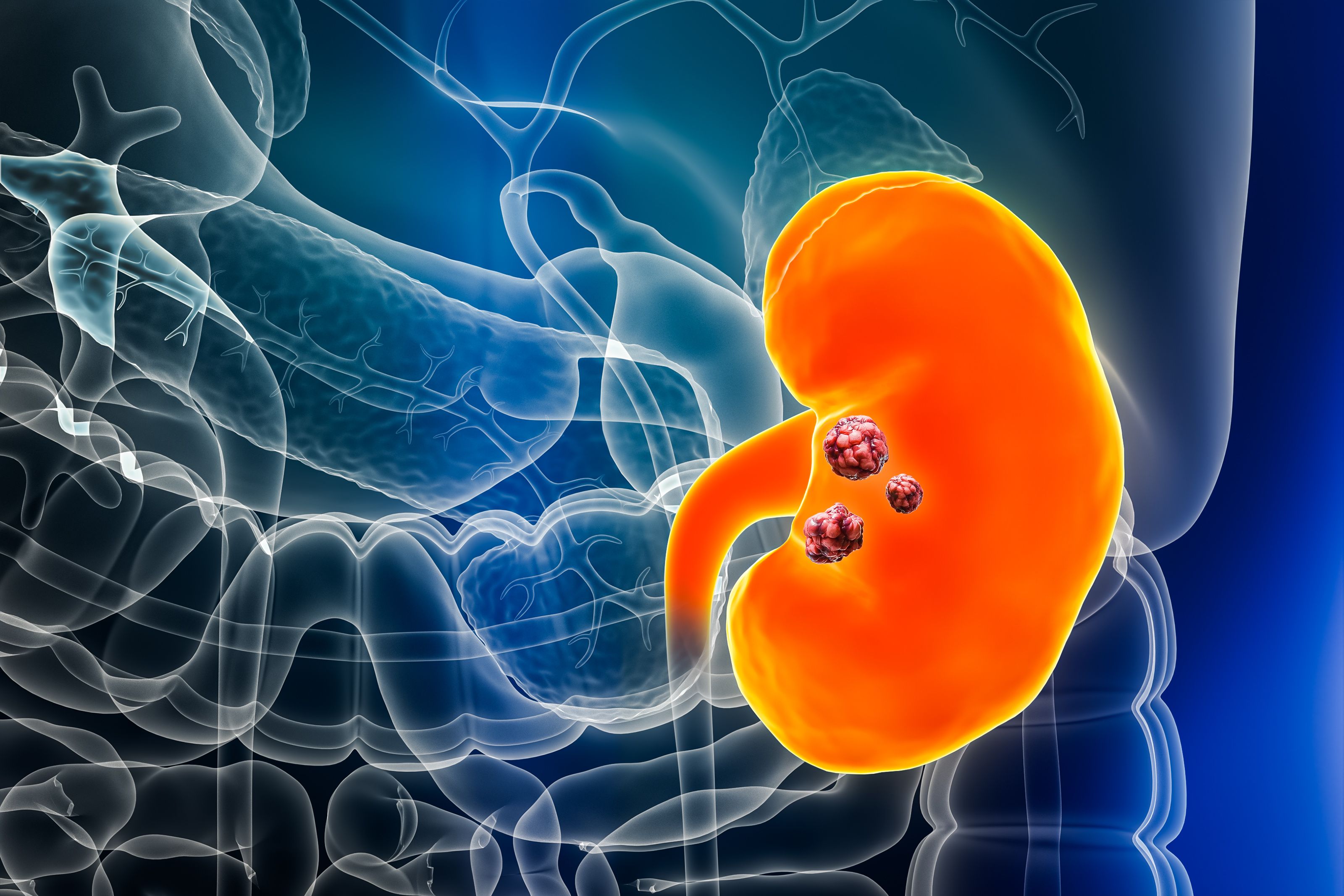Activity Observed With Cabozantinib/Nivolumab/Ipilimumab in RCCvh
In an interview with Targeted Oncology, Bradley A. McGregor, MD, discussed the main takeaways from a phase 3 study of cabozantinib, nivolumab, and ipilimumab for patients with renal cell carcinoma with variant histologies.
Bradley McGregor, MD

Treatment with the combination of cabozantinib (Cabometyx), nivolumab (Opdivo), and ipilimumab (Yervoy) elicited an objective response rate of 18% (80% CI, 10%-28%) with a disease control rate of 76% at a median follow-up of 10.4 months for patients with renal cell carcinoma with variant histologies (RCCvh).
Findings come from a multi-institutional, prospective, single-arm phase 2 trial (NCT04413123).1 According to the data presented, all responses were partial responses (PRs), with stable disease (SD) in 59% of patients, and progressive disease (PD) reported in 23%.
The median duration of response was not reached for responders; however, 86% maintained a response for greater than 6 months.
To further evaluate the combination, an expansion cohort is currently enrolling patients with RCCvh and administering 20 mg cabozantinib, nivolumab, and ipilimumab (NCT0441312).
“If patients do well, they will up the dose to 40 mg during maintenance with nivolumab to see if by decreasing that cabozantinib dose, we can allow for better nivolumab/ipilimumab dose intensity and density in the short term. This will lead to better results overall,” said McGregor, senior physician at Dana Farber Cancer Institute, and director of Clinical Research at the Lank Center for Genitourinary Oncology, in an interview with Targeted OncologyTM.
In the interview, McGregor discussed the main takeaways from the phase 3 study of cabozantinib, nivolumab, and ipilimumab for patients with RCCvh, and what the next steps for research entail.
Cancer in kidney | Image Credit: © Matthieu - www.stock.adobe.com

Targeted Oncology: Can you explain the rationale for this phase 2 study of cabozantinib, nivolumab, and ipilimumab in RCCvh?
McGregor: When we think about renal cell carcinoma, there's been a ton of advances in the treatment of renal cell carcinoma. However, a lot of those have been related to clear cell renal cell carcinoma, which is the most common type of kidney cancer accounting for 80% of renal cell carcinomas. But we know there's 20% of patients who present with RCC with variant histologies, what we call, non-clear cell, and we have been looking to make advances in that field.
For a long time, there have been incremental advances, but there have been some exciting advances recently. We were building upon what we saw with COSMIC-313 [NCT03937219] with nivolumab, ipilimumab, and cabozantinib, vs nivolumab and ipilimumab, and tried to bring that triplet into RCC with variant histology.
What were the methods and designs utilized in the trial?
This was a single arm, phase 2 trial which took 40 patients with renal cell carcinoma with variant histology who have received up to 1 prior to therapy, excluding immunotherapy or cabozantinib. They went on to receive induction with nivolumab and ipilimumab, and cabozantinib 40 mg daily, followed by nivolumab with cabozantinib until unacceptable toxicity or progression. Now, we have about a 10-month follow-up and are excited to present the first results.
Can you explain the main findings of the study?
We had enrolled 40 patients, and the majority of these patients had papillary renal cell carcinoma, but we did have 11 patients with chromophobe renal cell carcinoma. What we saw overall, was a response rate of 18% per RECIST, which was certainly lower than we would have hoped with minimal responses and chromophobe histology. This came with significant toxicities, over 40% of patients required high-dose steroids, and there were AST or ALT abnormalities as well.
I will caution though; this is only 10 months apart. If we look at the waterfall plot, 14 of the 40 patients remain on therapy. For lot of those patients, immunotherapy leads to tumor shrinkage that just hasn't quite reached that 30% mark, and so I think further follow-up will be critical to really understand the results of what we've seen so far.
For community oncologists, what are the key takeaways from this study?
This is a Herculean effort, but unfortunately, I don't think that the triplet of cabozantinib, nivolumab, and ipilimumab is ready as the current dosing for use in RCC with variant histology. I think we need to better understand which histologies actually do respond. That work is ongoing to get further breakdown not just papillary but papillary, FH-deficient, and in all the different categories, as well as looking at genomics and PD-L1.
At the same time, how can we tweak the dose better to allow for more efficacy? We have an additional expansion cohort now with 20 patients with variant histology where instead of using a dose of cabozantinib at 40 mg at an induction phase, we're decreasing that dose of cabozantinib to 20 mg. So, cabozantinib 20 mg with nivolumab and ipilimumab. If patients do well, they will up the dose to 40 mg during maintenance with nivolumab to see if by decreasing that cabozantinib dose, we can allow for better nivolumab/ipilimumab dose intensity and density in the short term. This will lead to better results overall.
REFERENCE:
McGregor BA, Huang J, Xie W, et al. Phase II study of cabozantinib (Cabo) with nivolumab (Nivo) and ipilimumab (Ipi) in advanced renal cell carcinoma with variant histologies (RCCvh). J Clin Oncol. 2023;41(suppl 16):4520. doi:10.1200/JCO.2023.41.16_suppl.4520
Enhancing Precision in Immunotherapy: CD8 PET-Avidity in RCC
March 1st 2024In this episode of Emerging Experts, Peter Zang, MD, highlights research on baseline CD8 lymph node avidity with 89-Zr-crefmirlimab for the treatment of patients with metastatic renal cell carcinoma and response to immunotherapy.
Listen
Beyond the First-Line: Economides on Advancing Therapies in RCC
February 1st 2024In our 4th episode of Emerging Experts, Minas P. Economides, MD, unveils the challenges and opportunities for renal cell carcinoma treatment, focusing on the lack of therapies available in the second-line setting.
Listen
Promising Results from Phase 1/2 Trial of NKT2152 for Advanced Kidney Cancer
September 20th 2024NKT2152, a novel oral HIF-2α inhibitor, showed promising results in treating advanced clear cell renal cell carcinoma, with an objective response rate of 20% in all-comers and 26.3% in the dose-escalation population.
Read More
GU Oncology Peers Explore Early Therapy Approaches in Low-Volume mRCC
September 19th 2024During a Case-Based Roundtable® event, Chandler Park, MD, moderated a discussion on treating patients with indolent or low-volume favorable-risk metastatic clear cell renal cell carcinoma in the first article of a 2-part series.
Read More